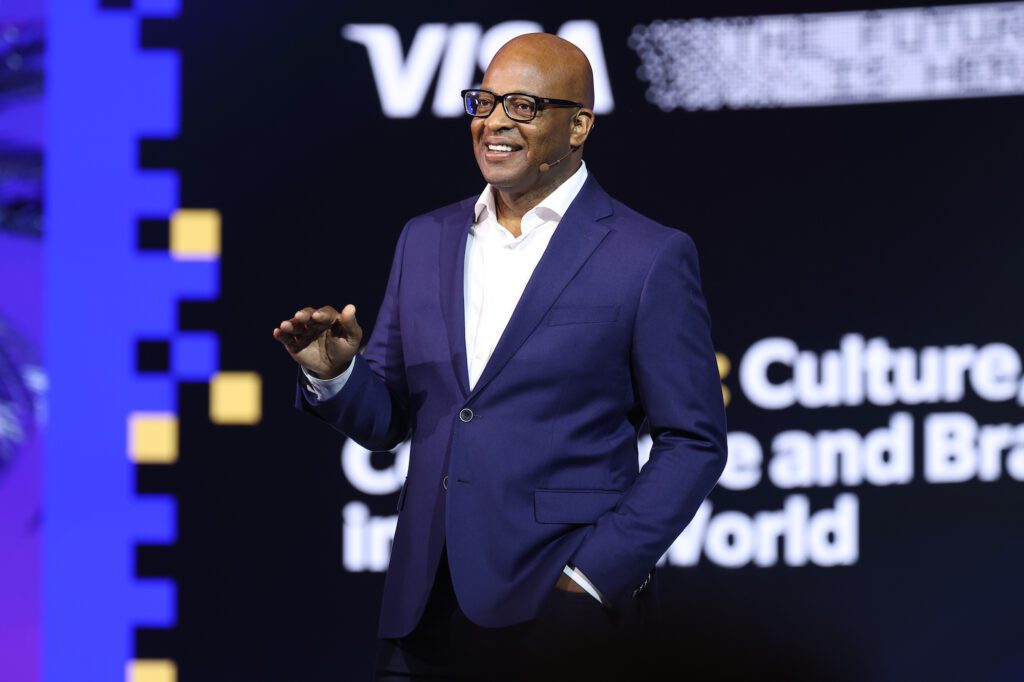Visa Chief Marketing Officer Frank Cooper III envisions a very near future in which AI agents will be doing our shopping for us—from browsing to selection to purchase. And he’s betting on Visa to keep that experience safe and secure, with an assist from expert partners in the AI space, including Anthropic, IBM, Microsoft, Mistral AI, OpenAI, Perplexity, Samsung and Stripe.
At its global product drop event on April 30, the company unveiled the Visa Intelligent Commerce initiative, which provides tools for AI developers and the use of its payments network to build commerce capabilities at scale. Ahead of a keynote session titled “AI Agents: Culture, Commerce and Brands in an AI World” at the POSSIBLE conference in Miami that same day, Chief Marketer sat down with Cooper to discuss Visa’s vision of AI-driven commerce, as well as the brand’s approach to other aspects of the business, from sports sponsorships to the creator economy to marketing to younger consumers.
Chief Marketer: What are the main takeaways from your session at POSSIBLE? What do you want people to come away from it with?
Frank Cooper III, CMO at Visa: For me there are three main takeaways from the session. The most important is the idea that the future is here, right now, and that we have an opportunity of shaping how that future plays out in our lives. My hope is that everyone in the audience will not view themselves as passive observers of this AI revolution that’s right in front of us, but that they start to get into creating their own agency, integrating AI into their lives… Because it sounded like, about a year ago, that this was some futuristic sci-fi film. But now it’s here right now, and if they participate actively, they could be part of shaping it.
The second one is—and this is a little more nuanced—the idea that culture drives commerce. Our aspirations and our fears, our problems and our dreams, our intentions, that’s actually going to shape how commerce plays out. You can have an agent running around doing anything you want. But what do you want that agent to do? Culture, the things that we collectively aspire toward, will help to shape what that looks like. I think we need to have, in our category, a lens on payments, but a lens on culture—and see how those two things intersect. I’m hoping everyone in the audience looks at that idea of culture, of commerce, having this symbiotic relationship.
And then the last one is marketing. Of all the managerial functions in a firm, I think marketing is going to be the most disruptive, from insights to content development, to media planning and distribution to measurement to digital marketing. All those areas are going to be fundamentally disruptive. So I think marketing has an opportunity to lead the way.
Chief Marketer: How is Visa specifically using AI internally? Obviously AI has been used by companies for many years, but what are some of the newer ways you’re using it?
FC: Visa, fortunately, has been using AI for over 30 years, but mostly on the product side. So if you’re looking at prevention of fraud, identity protection, cybersecurity overall, Visa has been using AI, and I think we’re on the leading edge of all that. In our products, it’s not a new thing. We’re just continuing to evolve. What is new is how we’re leveraging it within marketing. And so all those dimensions, insights and analytics, brand strategy, consumer segmentation, content development and distribution, we’re using it in all those ways.
The big shift, though, for me, and I think we’re right here at the inflection point, is moving from using that at the margins of what we do to bringing it into our core operating model. That’s the big shift. So every day I’m thinking about how does AI play a more central role in our operating model so we can move from humans using AI as an assistant to human-agent kinds of relationships, to human-led and agent executing. That’s the arc we’re going on. We’re at the early stages of that.
CM: So are you overseeing that? Many CMOs are responsible for AI integration in their organizations. What is your role specifically?
FC: As I said before, I think of all the managerial functions, marketing will be the most affected and has the greatest opportunity—but it’s everywhere. So I can’t say I’m leading it all, because if you’re a CFO and you want to track payments more effectively, AI can help you. In risk management, AI is helping us and has been helping us for a long time. But when it comes down to the consumer, the perceptions of the consumer and the behaviors of the consumer, I think we’re at the center of it.
If you talk about agent and commerce or AI shopping—AI-driven agents helping to make purchasing decisions—that could sit anywhere, but I think marketing’s at the center of it because we’re trying to get people to shift their behaviors and their perceptions, and that is exactly what marketing does, right? We drive profitable growth by helping people shift their behaviors and their perceptions. And so I do think we’re at the center of it, but more like a collaborative conductor, where we’re working with all our other partners internally.
CM: You mentioned Visa’s agentic future and the journey toward agent-assistant shopping. Are there any examples you can provide of what that might look like?
FC: I’ll start with shopping. So to me, it’s almost an inevitable outcome when you start to use AI for research. It’s search. You’re then going to use it for shopping, because it’s going to give you some results. Are you just looking for the results for a theoretical exercise? Most cases not. You want some kind of outcome. And so if I’m looking for a new pair of tennis shoes, and I saw these tennis shoes here that I took this picture of, AI’s going to help me with that. Where can I get it? And then the agent says, yeah, that’s consistent with what you like. Here’s the latest model. That’s an inevitable outcome. At least to the point of taking you to, “here are your options.”
As the agent gets to know you better, I think it takes you all the way to actually making the purchase on your behalf. There’s so many issues with that. For example, what if I didn’t want it? What if someone impersonates me with an agent? And that’s why I think Visa is so important in this equation, because like any value exchange, from the very beginning to now, what underlies it all is trust. And so I think what we are able to do is we have these networks of trust and these infrastructures that allow people to feel comfortable about making these types of transactions. It’s going to be bumpy along the way. We know that for sure, but I think you need Visa and other companies like that to help shore that up.
CM: I’m trying to envision it. Say you’re using ChatGPT and you’re searching for something, and then Visa’s right there to make the purchase. But the road to that is a long one, right?
FC: I don’t know if the road to that is a long one. I think that’s right upon us… Because I think early adopters are already doing it now. They’re creating agents; there are a bunch of different agent makers. People are already using AI to filter things out for them. It’s right around the corner. What is going to happen is within the next year—and I think you’re going to see some of this getting accelerated, hopefully, later today with our product drop—is people will start to get comfortable having an agent move them along the purchasing journey.
And so some people will be comfortable [with], “just give me my options and let me select it.” Some are going to get really comfortable [with] “help me figure out what I really need.” I don’t necessarily like to shop; I don’t want to go into a store. But it’d be great to have an agent that’s your personal stylist, gets to know what you like, your style, but sends you a bunch of pictures that filters out the things that you feel comfortable with, in the work setting [for example], and in a casual setting. It’ll be amazing to at least have those options. Even greater, though, maybe they know that that jacket you have had for 10 years needs to be changed. Maybe that sleeve’s getting a little worn. It’d be great for the agent to help transition into that. That’s not only right around the corner, I think it’s going to happen right now.
CM: Let’s switch gears to another part of the business: sports sponsorships and activations. In your view, how do you make a sports sponsorship actually affect culture—beyond just naming rights to a stadium or something similar?
FC: I love this question because we invest a lot in sports sponsorships and marquee assets. We’ve been doing that for a long time, but I think every brand has a decision to make about what role it wants to play with respect to these sponsorship platforms. It can be a traditional sponsor and sit adjacent to that platform, and hopefully you get some kind of halo effect, rubbing up against these properties. It doesn’t work that well, because people don’t see a lot of value in that by itself. You see that you wrote a check, you see that you’re adjacent to it. It might help with some top of mind awareness, by the way, so it’s not completely without value. But it doesn’t deepen the relevancy and connection with people.
What I found really works is if you are creating something, whether it’s original IP or design, a new experience that adds value either to the fan experience or the athlete experience. That’s when you start to get recognized for attribution for the brand. And so we spent a lot of time thinking about, what can we do that would add value to the fan experience or the athlete experience, or both? Nirvana is when both the athlete and the brand feels like, man, this would not happen, but for Visa. We love to see other people create these kinds of things. Whether it’s FIFA, or the Olympics, hopefully what you’ll see is that we are starting to build things that emanate from those platforms. But they’re original intellectual properties created by us.
At the Olympics—even before the Olympics—we did something called Visa Live at La Louvre, and we had Post Malone and Ayra Starr [perform]. We did that as almost an opening ceremony for the Olympics. And it was wildly successful. We did street art, but we took the Olympic rings and we took the Olympic moment and used that as a point of entry to hit a certain consumer segment. And so this idea of being a creator brand within sponsorships is at the heart of what we’re trying to do.
CM: Will you do more Visa Live concerts?
FC: Definitely. If you look at the music ecosystem on the live side of it, I think we’ve touched an area where there’s an unmet need, that is these more intimate settings with major artists in an environment that is unusual for them and for their fans. Not many people are doing that, and we feel like that’s a gap that we want to continue to fill. And we’ll do it sometimes on our own, and sometimes we’ll do it adjacent to major properties like the Olympics and FIFA Men’s World Cup.
CM: Moving on to the creator economy. You have the #TakeOn2025 social series that supports creators’ businesses. Overall, how you engaging younger creators right now?
FC: The creator economy and creators—that whole space is evolving so quickly. And it’s funny, if you asked me that a year ago, I would give you completely different answers. But this is our belief: that creators are small businesses. That’s the baseline for us. And like any small business, it needs earnings, they need infrastructure, they need guidance, they need connections, they need access. So we’re focused on trying to help in that regard. Some of the things that we’re doing would be infrastructure-based, like getting them Visa Direct so they can pay out quickly and get paid. Instead of waiting for months, there are ways to get them paid quickly.
Some of it is information. We did a platform called Get Paid about a year and a half ago, and that was more about having really experienced creators and influencers give their tips to help in terms of what actually allows you to position yourself for the greatest probability for success. How do you set it up, how do you connect to people, how do you build your business? Some of this is informational, and some of it is just giving people access to each other. We’re building a creator network; we have 700 people and we try to bring them together. We did it with the athletes for the Paris Olympics. We brought them all to Paris—about 110 athletes—and brought people from different platforms, from TikTok to Instagram, to help them get better as creators.
A large part of what we are trying to do here is help creators move forward. And what I love about this idea of moving forward is that it’s embedded in transactions. Moving forward is either getting paid or you’re buying something, [for example], to help get a ring light. You have to buy it somewhere, and hopefully you bought it on a Visa card with a Visa credential. You need transportation. With mass transit, you’re probably going to tap your phone and hopefully that’s a Visa credential. But all these things represent the steps that they’re taking forward, and we want to be the champions of their everyday progress.
CM: Visa’s “Everywhere you want to be” be tagline—you’ve redefined it for a younger generation. What was behind the decision to revamp the idea for younger folks?
FC: We looked at what was happening in the world and in culture. If you go back to the late nineties, that’s when everyone was talking about the experiential economy. They’re like, you know what, material things are really important. But man, these experiences, that’s where real value is. And so pioneer James Gilmore wrote the book, “The Experience Economy.” People started coming out with Planet Hollywoods and Hard Rock Cafes. And these are all about experiences. And “everywhere you want to be” at that time was a reflection of that. It’s a physical destination—the things that you want to experience.
Fast forward to today… People still want that, by the way… but people are much more interested in who they can become. So, “everywhere you want to be” is not just a physical destination, it’s also an expression of the person that you want to become… Be the fan that you want to be. Be the entrepreneur that you want to be. Be the chef that you want to be. We felt like “everywhere you want to be” reflects that really well. We think that is the cultural epoch that we’re in, where people are looking for others and institutions, including brands, that can help them on that journey of becoming the person they want to be.
CM: Let’s talk about your fascinating career path—from Def Jam to PepsiCo to BlackRock. What did you take from your previous gigs that you’re applying to today?
FC: It’s funny, because it’s not like I set up one day and mapped it out to, I’m going to go from entertainment into CPG into technology and financial services, and then I’ll be well rounded and ready to go… The thing, though, that I feel fortunate about is I started off in the culture space. Music was really a space where you had to understand what’s happening in culture and how do you leverage that in terms of commerce. And I think that’s the thing that differentiates great brands today. Back then you could get away with more functionality and image. Culture—now—is at the core of the greatest brands.
But the thing that stuck with me throughout my entire career, whether I was in the music industry or at PepsiCo or at BlackRock and now Visa, was that I always felt like I wanted to be able to use business and connect to business in a way that helped others become better. It expanded the potential of people on the individual level and on the community level. And I felt like music did that. Because it is a business, it is fun, it’s entertainment, but in those critical years, music can help people get through all sorts of things. Music can open up communities. Look at what’s happening with Afrobeats and Latin urban and K-Pop. It’s now expanding our sense of going beyond geographic territories. It’s a powerful force in expanding the potential of people.
If I look at investments and money, there’s nothing more cultural than that. I didn’t think about it that way at first, but money and value exchange and how people earn their money, how they spend it, how they save it, how they invest it, how they give it away, that becomes a fundamental part of who you are. It is about as cultural as it gets. And so I felt like there was this opportunity in this industry to look at it through a category lens for sure, and understand how the category works, but then put a cultural lens on top of that. The microscope is probably the category; telescope is the culture. You bring those two things together and you start to see new opportunities. My career is around this idea of expanding people’s potential and applying it to different industries, and I’ve never felt more energized than in this particular category. Because I think it’s so fundamental to people’s lives and it’s needed.








